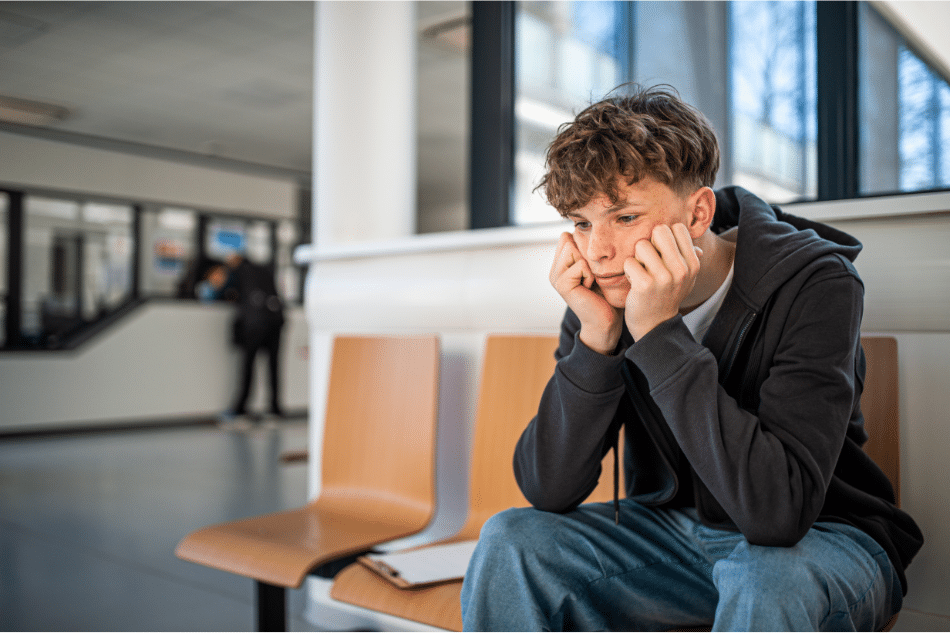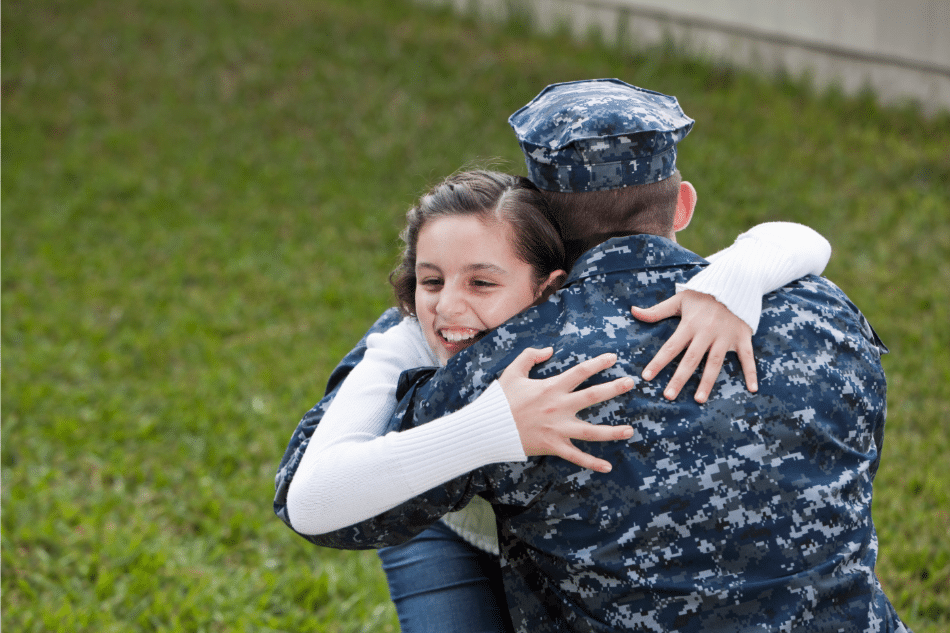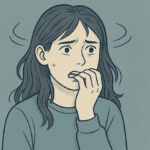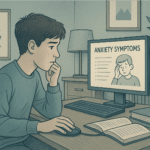Military Life and Teen Anxiety: How to Manage the Uncertainty

Do you ever feel like your life is always in motion – even when you’re standing still?
If you’re growing up in a military family, this feeling may be all too familiar. One moment you’re settled in school with friends and getting into the swing of things. Then, the next…your parent gets their orders, and you’re packing up your entire life to start over in a new place. Again.
For teens in military families, inconsistency can feel never-ending. Change is a way of life, and with change comes uncertainty. You don’t know when a parent will leave, when you’ll have to move again, or how long you’ll be in the next place. This uncertainty can be really tough and stressful. And stress can show up as anxiety: worrying too much, being overwhelmed by everything, or just not feeling like your normal self.
Anxiety in military youth is common, and there’s nothing wrong with you if you feel like this. Mission Prep can help you understand why military life and teen anxiety can go hand in hand and learn ways to manage it. We’re also here to remind you that, even if your world is full of uncertainty, you can still find balance and calm.
This article can get you started in understanding the link between military life and teen anxiety by covering:
- How military life can lead to feelings of anxiety
- The signs of anxiety symptoms in teens
- Ways of coping with military life and teen anxiety
- Mental health support options for military kids
- Where to find professional support

Military Life and Teen Anxiety
Being a teenager can be hard enough by itself, but adding military life to the mix could bring a whole host of extra challenges. Uncertainty abounds, and the only constant might seem to be change.
Moving to a different area every few years, going through school transitions, and making new friends, none of which you signed up for, can be teenage anxiety triggers. You may even end up feeling like you don’t have any control over your own life.
Some of the military-induced stress teens face is often caused by challenges like:
- Moving house often
- One parent leaving to serve in the forces
- Changing schools
- Missing friends
- Adapting to a new location
- Pressures to “stay strong” and hide feelings
- Struggling to make new friends and fit in as the “new” kid
Adding to these issues, you may also have indirect exposure to violence because of what you hear about your mom or dad when they are on active duty and deployed. For instance, you may learn details about conflict and fear that they will get hurt. You might also be separated from them for months at a time while they are off on missions, and worry whether they will make it home. All of these stresses and worries can add up and make you feel anxious, angry, or sad more often than not. You may even find that your relationships and grades suffer.1-3
If you find yourself overthinking, lying awake at night, or feeling like your heart could break through your chest because it’s pounding so hard, pause for a moment. What you’re feeling may be anxiety. And anxiety is very treatable. To help you better understand whether what you’re going through is anxiety, the following information covers the signs and symptoms of anxiety in military teens.
Identifying Anxiety Symptoms in Teens
If you’re experiencing anxiety, you may notice signs such as:7,8
Heart pounding or racing- Stomach aches
- Headaches
- Tense muscles
- Constant tiredness
- Sleep problems
- Excessive worrying
- Irritability or nervousness
- Restlessness
- Feeling on edge or wound up
- Trouble concentrating
- Avoiding things or people that make you feel anxious
- Dropping grades or ditching school
- Asking others for reassurance
Coping Skills for Anxious Teens
The following coping skills are useful and effective ways to get anxiety symptoms under control.
Simple Stress Relief Techniques for Teens
There are many ways to relieve stress, and you may already have some of them at your fingertips. For example, journaling is one of these techniques, and evidence shows that it can help you feel better.10 It’s a great way to release pressure building up inside and let it out onto paper. This way, it can help to lower stress and reduce anxiety symptoms.11
Music can also help soothe the soul. So, if you’re feeling stressed and restless, listening to something calming may help. Alternatively, pick a song with lyrics that connect to how you’re feeling, as this can help you feel better understood and normalized in your emotions.
Finally, doing something physical, such as walking, dancing, or playing sports, can improve your mood and reduce stress. Exercise boosts our “feel good” chemicals, and helps to burn off the stress hormones cortisol and adrenaline.12
For more info, check out our free resources below:
Breathing Exercises for Anxiety Teens
Mindfulness has become popular in the last few years, and for a very good reason: it really works for managing conditions like anxiety.13 Mindfulness involves being present in the moment and allowing your thoughts to pass through your mind, like clouds in the sky, without needing to cling to them or judge them.Yet, when you feel anxious, it can feel very hard to feel present in the here and now. This is where breathing exercises come in. Breathing comes naturally, right? You probably aren’t even aware you’re doing it, it’s such a basic bodily function that it just…happens. But you can train your breathing to bring your focus into the present moment, anytime, anywhere.
There are many different breathing techniques, but one useful one is called “square breathing.” It’s called as such because all parts of the breathing process are imagined like a square: all four sides have equal length. So you breathe in for four seconds, hold your breath for a count of four, breathe out for four, then pause for four. Then you repeat the whole process until your body and mind start to feel calmer.
Routines and Structure
Life can feel chaotic at times, and military life and teen anxiety can make it feel even more so. This is why having a routine can help bring structure to what feels like constant mayhem. Routines can be as simple and flexible as having a wake-up and bedtime, creating schedules for breakfast, lunch, and dinner, or having after-school clubs on certain days. You could even set aside a certain evening every week as “family night.” For instance, choosing Saturday nights for watching films and having favorite foods. Think about what helps you the most, and see if you can work it into a routine.
Talk About It
One of the most powerful ways of managing anxiety is talking to someone you trust about what you are feeling. Maybe this person is a parent, teacher, or counselor – or even a trusted friend. Regardless of who they are, reaching out and talking to someone can make you feel less isolated with your problems. Plus, research shows that peer support can truly help improve wellbeing.3
While each of these techniques can work to relieve anxiety, it’s important to remember that they can’t replace professional mental health treatments. We’ll dive into your options for support next, including how to know when you need mental health support and what treatments are available.
Mental Health Support for Military Kids
Sometimes, no matter how hard you try, self-help and coping strategies might not be enough by themselves. If military life and teen anxiety are causing you daily problems or your symptoms of anxiety aren’t fading or are getting worse, you may benefit from professional mental health treatment. Treatment could come in the form of talking therapy, medication, or a combination of the two – it all comes down to your unique needs. The following information covers these options.
Therapy for Anxious Military Teens
Therapy is an effective treatment for anxiety and is often the first one recommended by professionals. Cognitive behavioral therapy (CBT) is particularly popular as it has been shown to be especially successful.14 CBT can help to reduce symptoms such as a racing heart and constant worries, as it teaches people to manage anxiety when it comes up.Therapy can also help you understand where anxiety comes from and work through any issues or concerns with a trained counselor who truly gets how military life can affect teens. It is a safe, confidential space for exploring how you genuinely feel. Check out our page on What To Expect From Therapy For Military Teens for more info.
Medication for Teen Anxiety
If therapy alone doesn’t seem to bring relief, or you have severe anxiety, medication is a good treatment option alongside therapy. The most common medications used for teen anxiety are antidepressants (SSRIs and SNRIs) and anti-anxiety medications (benzodiazepines).14Antidepressants can help you feel calmer, lift your mood, and regain balance. However, it usually takes a few weeks for their effects to kick in. Anti-anxiety meds like benzodiazepines, on the other hand, are very effective for tackling intense anxiety as they work quickly. However, they can only be taken short term.
All medications have the potential for side effects, so it’s best to talk to your doctor about the pros and cons before making a decision on whether to take medication for anxiety.
If you are struggling to control your worries or mood, it’s always a good idea to talk to a healthcare professional, such as a doctor or therapist. They will be able to provide you with the best support possible and point you in the direction of extra resources that may help you.

Mission Prep: Find Anxiety Support as a Military Teen
Being part of a military family might mean you’ve had to grow up pretty fast. Learning to adjust to changes, being flexible, and saying goodbye more often than you thought you would have to. It all takes strength. But even the strongest people need support sometimes, especially when anxiety turns up and won’t leave you alone.
If you’re struggling to manage your anxious feelings, you’ve already taken a huge first step just by reading this page. Try taking one more, whether that’s doing a breathing exercise, talking to someone you trust, or reaching out for professional help. You don’t have to figure this all out on your own.
If you’re looking for real support from people who understand what you’re going through, reach out to us here at Mission Prep. We can help you build coping skills, manage anxiety, and feel more in control of your mental health. Our licensed therapists have a wealth of experience providing support to teens from military families and recognize the challenges you face.
Contact us today to start your journey toward a better tomorrow. You’ve got this – and we’ve got your back.
References
- Miller, A. (2023, July 5). The Effects of Military Life on Child Development and Mental Health. ASYMCA National Headquarters. https://asymca.org/blog/effects-of-military-life-on-child-development/
- Frederick, J., & Siebler, P. (2022). Military Children: Unique Risks for Mental Health and Wellbeing and Implications for School-Based Social Work Support. Smith College Studies in Social Work, 92(4), 219–239. https://doi.org/10.1080/00377317.2023.2189469
- Kinley, J., Feizi, S., & Elgar, F. J. (2023). Adolescent mental health in military families: Evidence from the Canadian Health Behaviour in School-aged Children study. Canadian Journal of Public Health, 114(4), 651–658. https://doi.org/10.17269/s41997-023-00758-5
- American Academy of Pediatrics, American Academy of Child and Adolescent Psychiatry, & Children’s Hospital Association. (2023). Military Teen Experience Survey: Mental Health. https://www.militaryfamily.org/wp-content/uploads/2023-MTES-Mental-Health.pdf
- Ryan-Edger, K. (2025, June 6). Through Their Eyes: 2024 Military Teen Experience Survey results. National Military Family Association. https://www.militaryfamily.org/through-their-eyes-2024-military-teen-experience-survey-results/
- Opie, J. E., Hameed, M., Vuong, A., Painter, F., Booth, A. T., Jiang, H., Dowling, R., Boh, J., McLean, N., & McIntosh, J. E. (2024). Children’s Social, Emotional, and Behavioral Outcomes in Military Families: A Rapid Review. Journal of Child and Family Studies, 33. https://doi.org/10.1007/s10826-024-02856-5
- Katzenstein, J (2024, May 22). Anxiety and Stress in Teens. Johns Hopkins Medicine. https://www.hopkinsmedicine.org/health/conditions-and-diseases/anxiety-disorders/anxiety-and-stress-in-teens
- Miller, C. (2025, February 6). How anxiety affects teenagers. Child Mind Institute. https://childmind.org/article/signs-of-anxiety-in-teenagers/
- James, T., & Countryman, J. (2012, February 1). Psychiatric effects of military deployment on children and families: The use of play therapy for assessment and treatment. Innovations in Clinical Neuroscience. https://pmc.ncbi.nlm.nih.gov/articles/PMC3312898/
- Sohal, M., Singh, P., Dhillon, B. S., & Gill, H. S. (2022). Efficacy of journaling in the management of mental illness: A systematic review and meta-analysis. Family Medicine and Community Health, 10(1), e001154. https://doi.org/10.1136/fmch-2021-001154
- Stanford Medicine Children’s Health. (n.d.). Journaling for mental health. Retrieved June 30, 2025, from https://www.stanfordchildrens.org/en/topic/default?id=journaling-for-mental-health-1-4552
- Harvard Health Publishing. (2020, July 7). Exercising to relax. https://www.health.harvard.edu/staying-healthy/exercising-to-relax
- Mandriota, M. (2022, June 30). The benefits of mindfulness meditation for teens. Psych Central https://psychcentral.com/health/the-benefits-of-mindfulness-meditation-for-teens
- Miller, C. (2025, April 9). Best anxiety medication for children and teens. Child Mind Institute. https://childmind.org/article/best-medications-for-kids-anxiety/



















